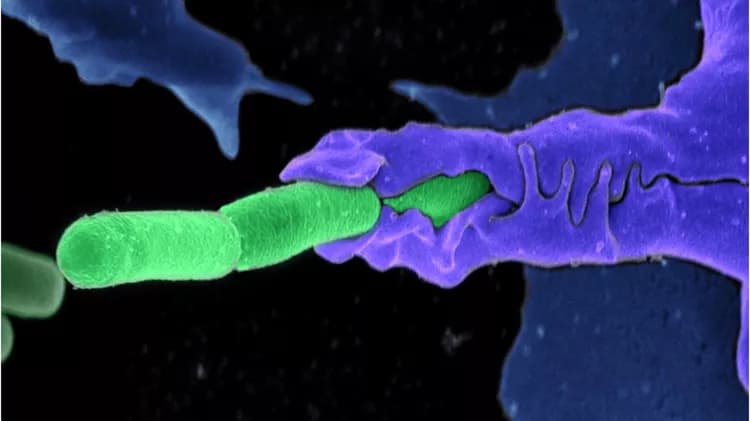
Immune Cells Help Fat Deal With Environmental Challenges
Immunosuppressive regulatory T-cells play an important role in the functioning of adipose tissue. This is the discovery of scientists from the Helmholtz Diabetes Center (HDC) at Helmholtz Zentrum München and the Technical University of Munich (TUM). Their findings are published in the journal Cell Metabolism.
The number of obese people as well as those suffering from type 2 diabetes is increasing worldwide. Both disorders are associated with metabolic changes including amplified inflammatory responses in adipose tissue. "Previous studies have indicated that immunosuppressive regulatory T-cells -- or Tregs for short -- play an important role in these processes," explains the leader of the study Dr. Carolin Daniel, group leader at the Institute for Diabetes Research (IDF) of the Helmholtz Zentrum München and a scientist in the German Center for Diabetes Research (DZD). "We now wanted to examine how these immune cells might support adipose function in more detail."
In an experimental model, Daniel, together with co-first authors Dr. Stefanie Kälin and Maike Becker and colleagues, determined that the number of Tregs in adipose tissue increases in response to different environmental stimuli. These stimuli included a short-term cold treatment, stimulation of the sympathetic nervous system (?3-adrenoreceptors) or short-term high-caloric exposure. "All these stimuli supported those immunosuppressive cells directly in the adipose tissue," says Becker.
Fat burning activated
The magnitude of the increase in Tregs differed depending on the type of adipose tissue: it was particularly pronounced in brown fat, somewhat weaker in subcutaneous fat and weakest in visceral fat. To investigate the specific function of Tregs, the researchers determined how gene expression changes in adipose tissue. Especially in brown fat, genes were activated that promote heat production (thermogenesis) as well as those that are used for the breakdown (lipolysis) and burning (oxidation) of fatty acids. Subsequent experiments revealed that the signalling molecules Stat6 und Pten play a vital role in this process.
"A better understanding of the immunological mechanisms involved in the target tissue will be critical for the development of personalized interventions in order to improve adipose tissue function during obesity and diabetes," says the leader of the study Carolin Daniel. "Our experiments show for the first time that Tregs can support fat depots in dealing with environmental challenges."
"Our findings highlight the complex interactions between our body and the environment. We have known for a while that hormones play a key role here -- but now have to accept that immune cells may be just as important for a balanced metabolism," comments Prof. Dr. Matthias Tschöp. He is the scientific director of the HDC at Helmholtz Zentrum München and holds the chair for metabolic diseases at the TUM. "These insights therefore help us tremendously with designing more efficient ways to therapeutically optimize when and how to store calories."
Prof. Dr. Matthias Mann from the Max Planck Institute of Biochemistry in Martinsried as well as the group of PD Dr. Benno Weigmann from Universitätsklinikum Erlangen also made significant contributions to the study.
Materials provided by Helmholtz Zentrum München - German Research Center for Environmental Health. Note: Content may be edited for style and length.
Disclaimer: DoveMed is not responsible for the accuracy of the adapted version of news releases posted to DoveMed by contributing universities and institutions.
References:
Stefanie Kälin, Maike Becker, Verena B. Ott, Isabelle Serr, Fabian Hosp, Mohammad M.H. Mollah, Susanne Keipert, Daniel Lamp, Francoise Rohner-Jeanrenaud, Victoria K. Flynn, Martin G. Scherm, Lucas F.R. Nascimento, Katharina Gerlach, Vanessa Popp, Sarah Dietzen, Tobias Bopp, Purna Krishnamurthy, Mark H. Kaplan, Manuel Serrano, Stephen C. Woods, Philipp Tripal, Ralf Palmisano, Martin Jastroch, Matthias Blüher, Christian Wolfrum, Benno Weigmann, Anette-Gabriele Ziegler, Matthias Mann, Matthias H. Tschöp, Carolin Daniel. (2017). A Stat6/Pten Axis Links Regulatory T Cells with Adipose Tissue Function. Cell Metabolism. DOI: 10.1016/j.cmet.2017.08.008
Related Articles
Test Your Knowledge
Asked by users
Related Centers
Related Specialties
Related Physicians
Related Procedures
Related Resources
Join DoveHubs
and connect with fellow professionals

0 Comments
Please log in to post a comment.